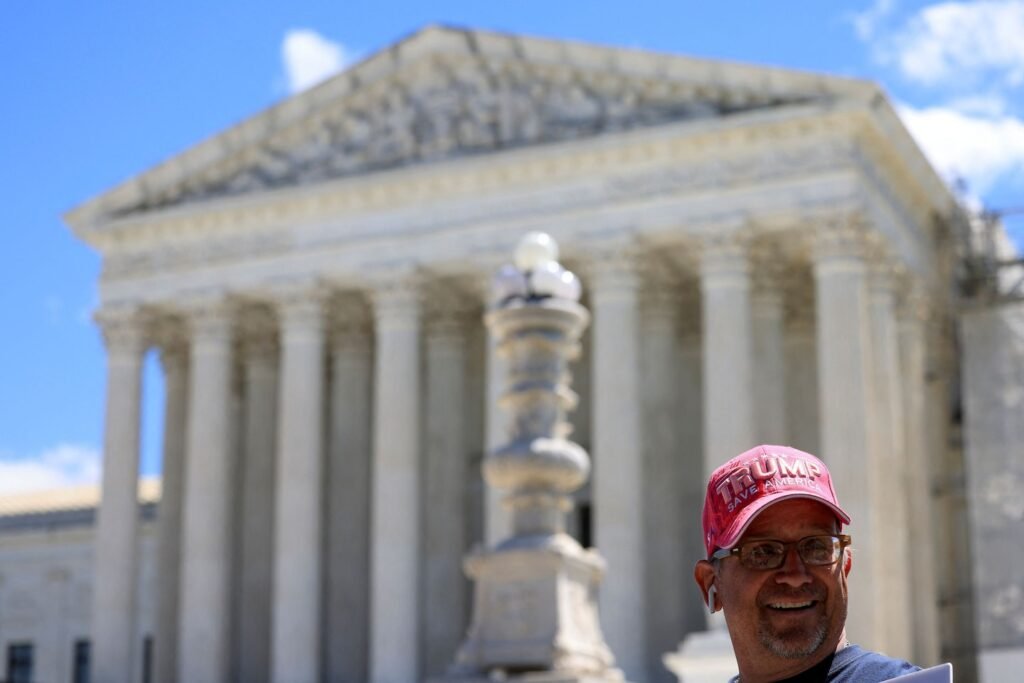A majority of Americans — more than two-thirds — said no. There were party lines, but Democrats overwhelmingly rejected the idea that the president should have such power. Republicans also had majorities opposed granting such protections, but to a lesser extent.
That’s not entirely surprising, given the question’s origins: Donald Trump, who was indicted on state and federal charges for attempting to overturn the results of the 2020 presidential election, was arguing that he (and all presidents) have implicit protection from prosecution for engaging in such conduct. We can assume that Republicans are more likely to support this kind of immunity than Democrats, because some of them recognized that we were really talking about Trump.
But there’s no need to speculate here: YouGov specifically asked half of its respondents whether Trump should have such immunity. Again, most respondents said he shouldn’t. But this time, a majority of Republicans (about two-thirds) said he should.
On Monday, the Republican minority got their wish, thanks in large part to the institutional advantages Republicans have enjoyed in the Senate and the Electoral College.
There are nine justices on the Supreme Court. The longest serving justice is Justice Clarence Thomas, who was nominated by President George H. W. Bush and confirmed in 1991. The newest justice is Justice Ketanji Brown Jackson, who was nominated by President Biden and confirmed in 2022.
But there is a difference in the confirmations of the two justices: Thomas’ highly controversial nomination received 52 votes in the Senate, while Jackson’s was a much less controversial nomination in the modern era of abolished bipartisan confirmation of Supreme Court nominations; she received 53 votes.
But because of the way power is distributed in the Senate, Jackson had the support of senators representing a much larger portion of the country than Thomas did: Rural, sparsely populated states get the same two senators as urban, densely populated states. So, in the standard example, California’s 39 million residents get the same number of senators as Wyoming’s 580,000 people.
With half of each state’s population assigned to each senator, Thomas received the support of senators representing just under half the population, while Jackson received the support of senators representing 57 percent of the population.
Using the same calculation, three other sitting justices also received support from senators who represent less than half the country: Justices Neil M. Gorsuch, Brett M. Kavanaugh and Amy Coney Barrett, all of whom were appointed by President Trump.
Of course, Trump won the presidency thanks to another power structure that often favors Republicans: the Electoral College. Though he lost the popular vote in 2016, he still became president and earned the right to immediately fill a vacancy on the Supreme Court and then fill two more vacancies during his presidency.
Of course, he had the right to fill the vacancy immediately, That’s itself a result of the Senate’s power imbalance: Then-Senate Majority Leader Mitch McConnell (R-Ky.) vetoed President Barack Obama’s 2016 nomination of Merrick Garland, a move made possible by the Republican majority in the Senate, which represented roughly 47% of the country’s population. (When another Supreme Court vacancy arose in 2020, McConnell used his party’s majority to quickly fill it.)
The other two justices, Chief Justice John G. Roberts Jr. and Justice Samuel Alito, benefited from these advantages in different ways. Justice Alito was confirmed by senators representing just over half the country’s population, even though he received 58 votes in the Senate. But like Roberts, he was nominated by George W. Bush, who was first elected in 2000 thanks to the Electoral College. He was reelected in 2004 by a majority of the popular vote, the first Republican to be reelected since his father was elected in 1988. But it is unclear whether a Republican would have been elected four years later if the popular vote had determined the winner in 2000.
Defenders of Trump and the Supreme Court will be quick to point out: “That’s how the system works.” And it’s true. That’s right: Five of the nine Supreme Court justices are nominated by presidents who lose the popular vote when they first run for office, and four of them are confirmed by senators who represent less than half of the nation. And they can decide, against the opinion of two-thirds of the nation, that a president who lost the popular vote should be immune from criminal prosecution for trying to overturn the election results after losing the popular vote again.
That’s how the system works.

